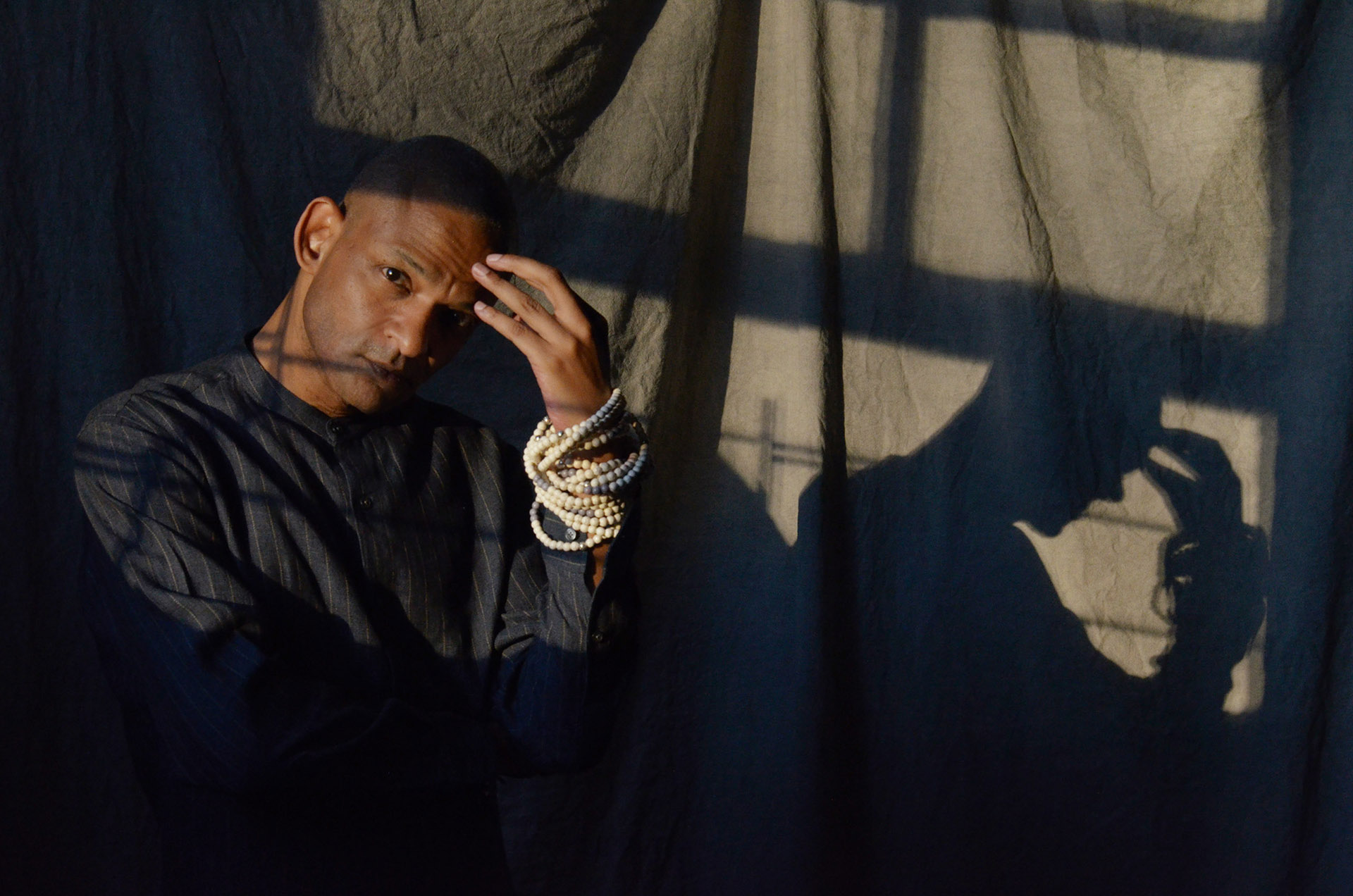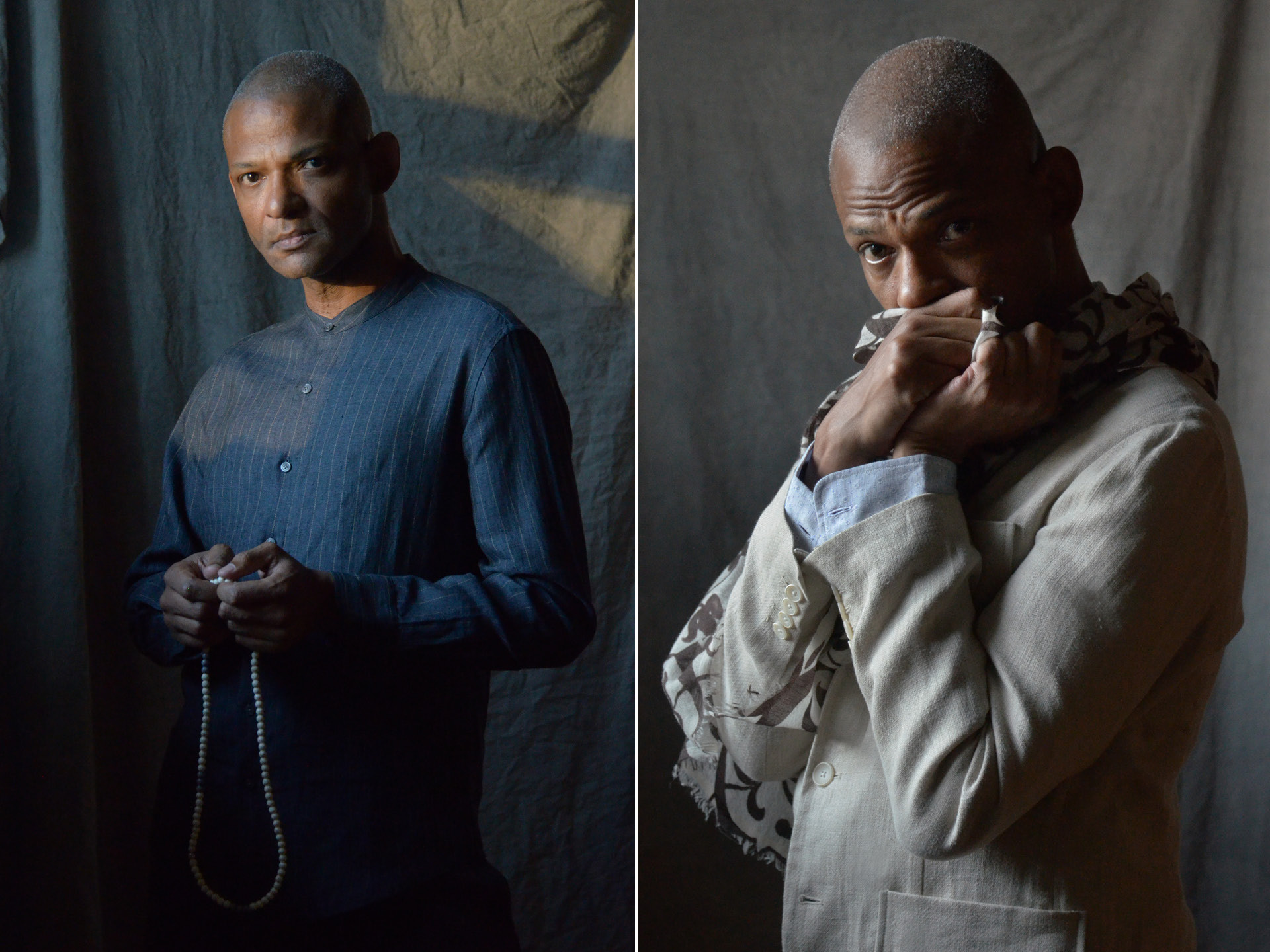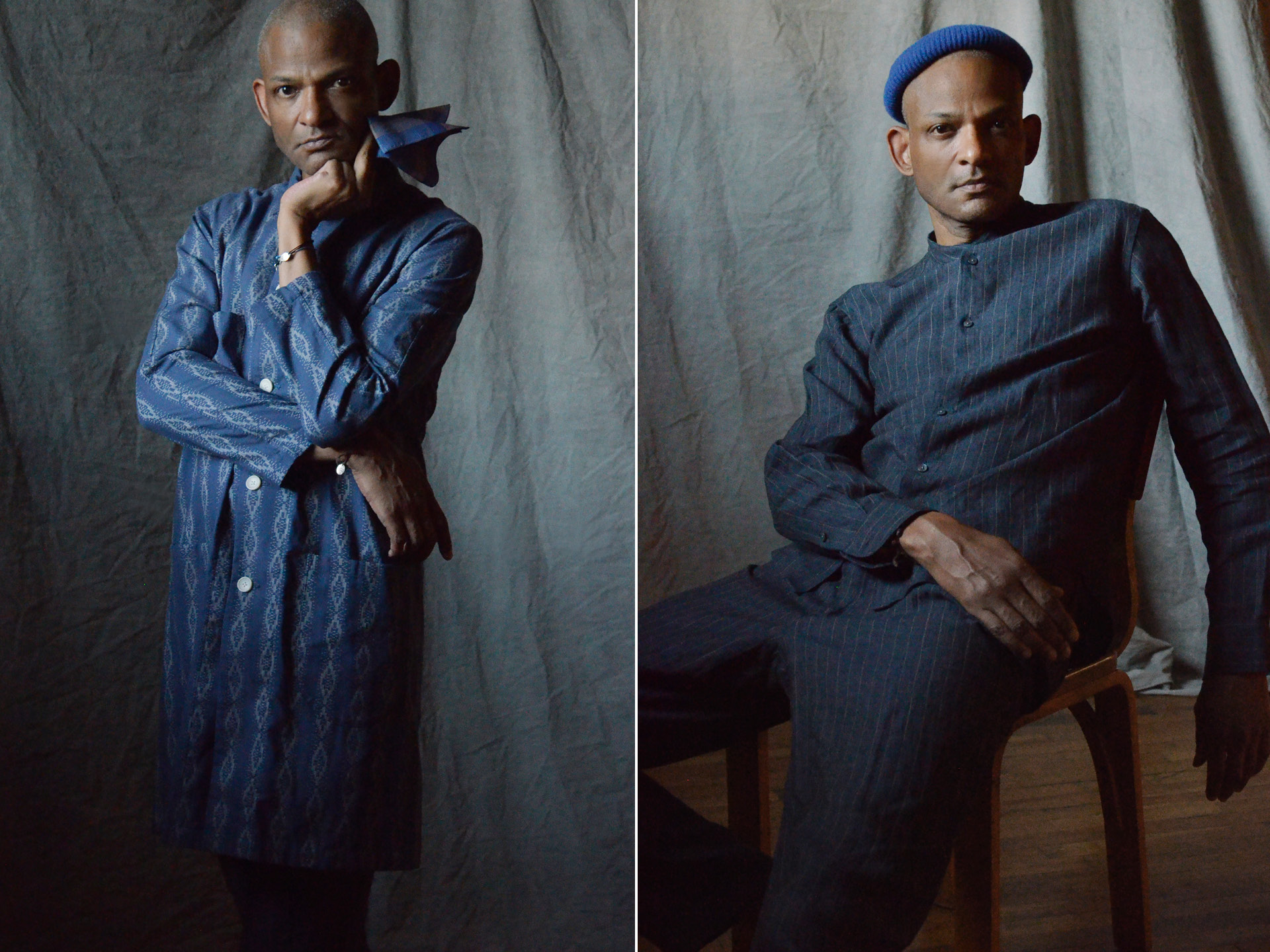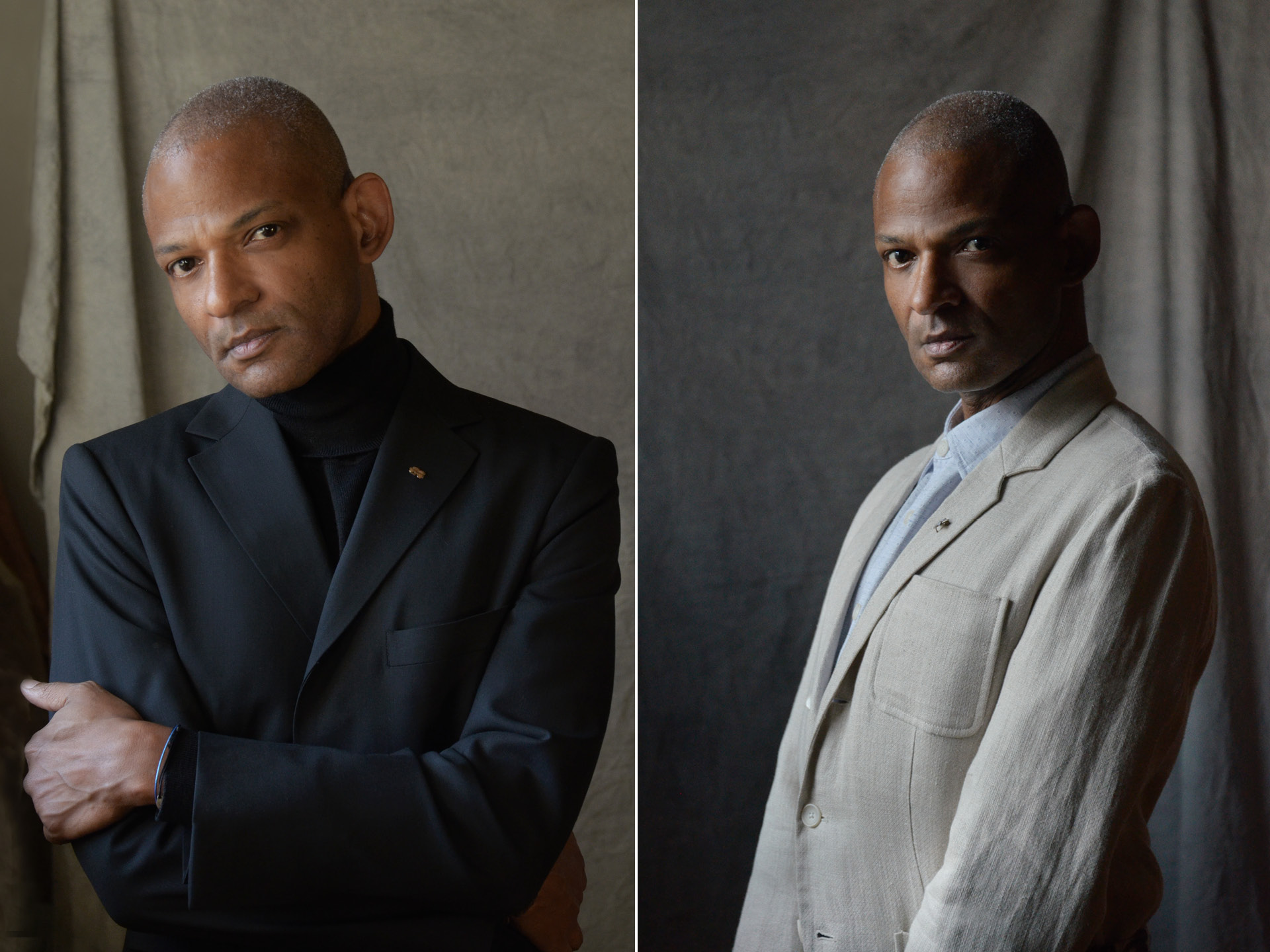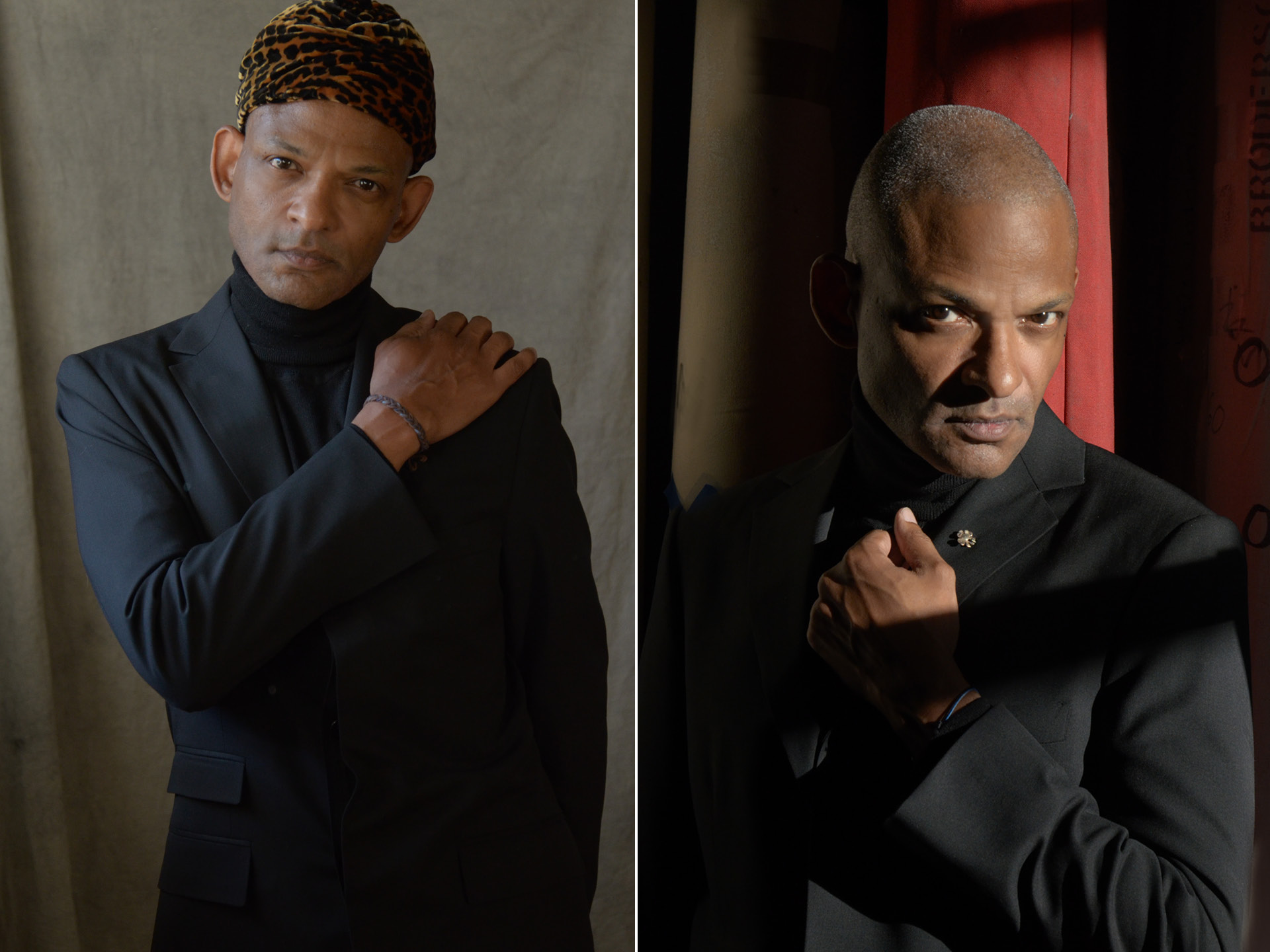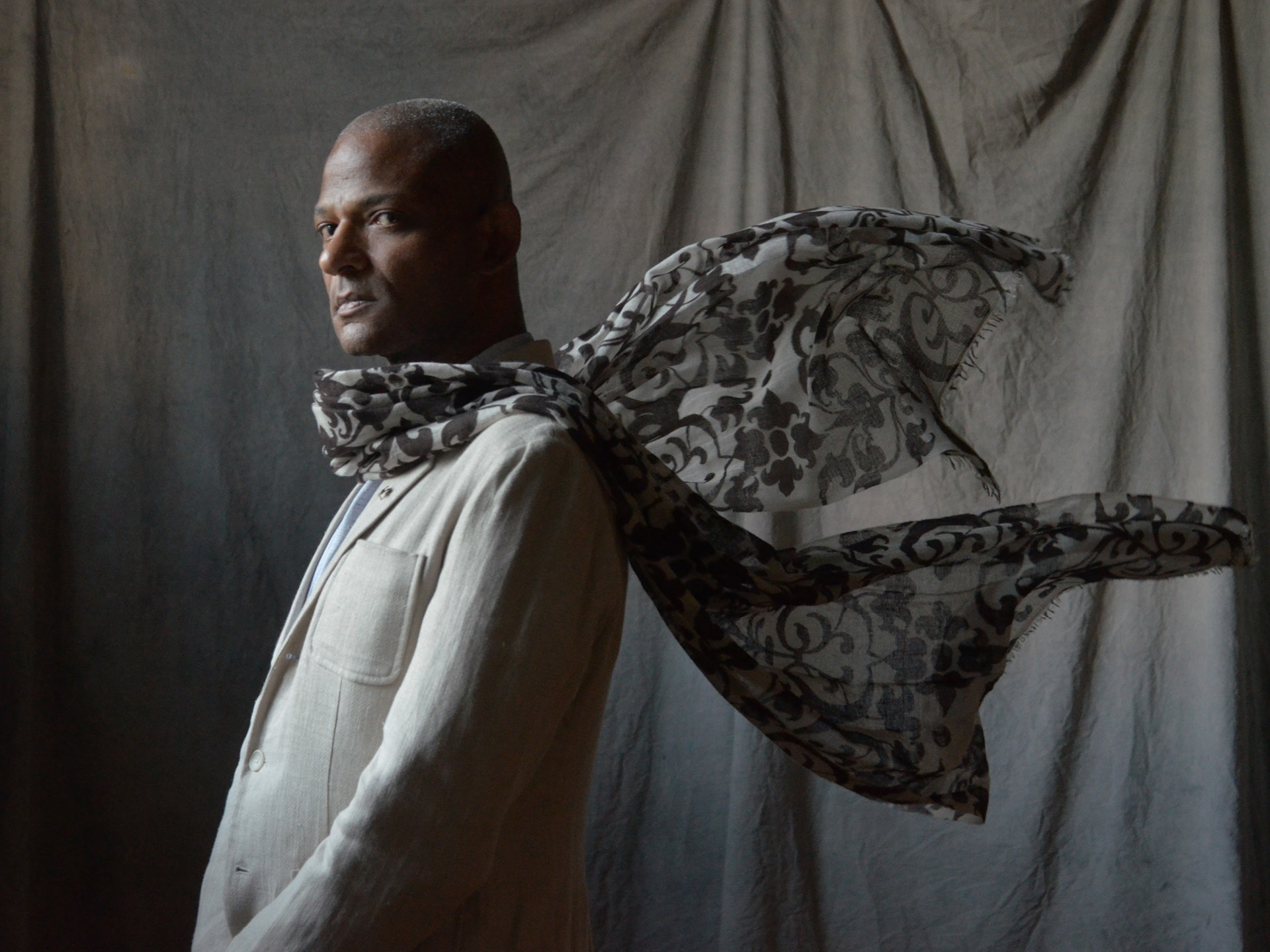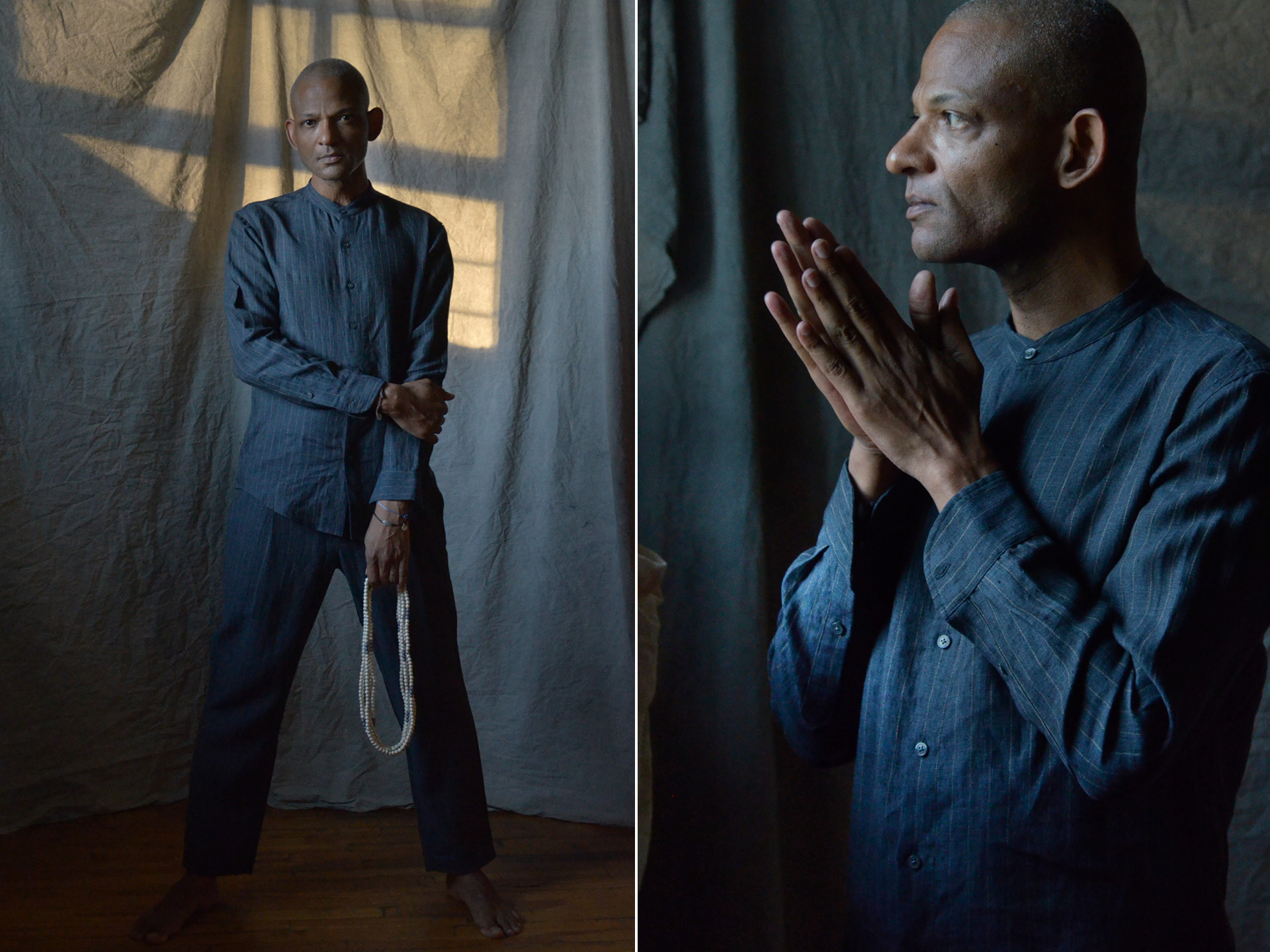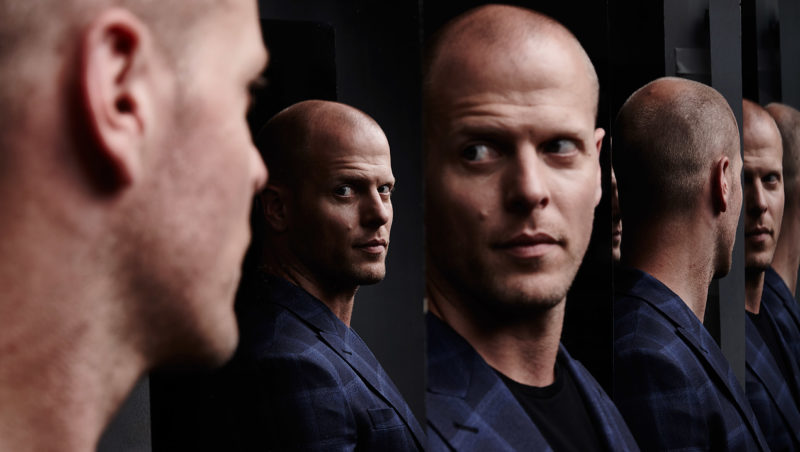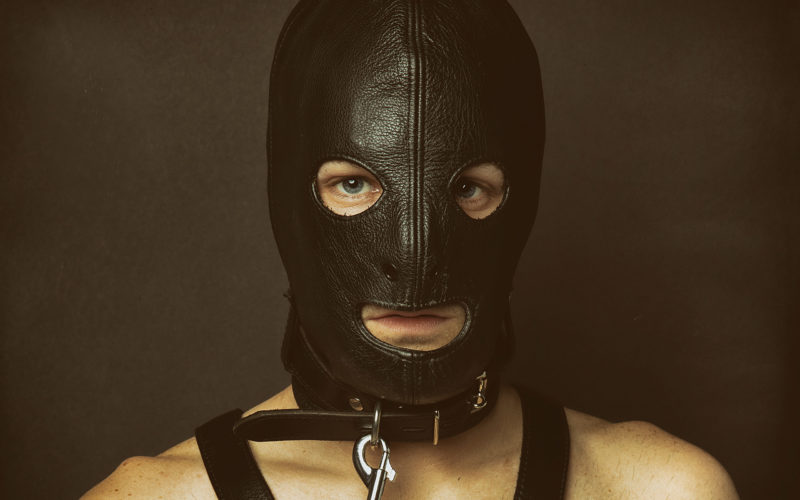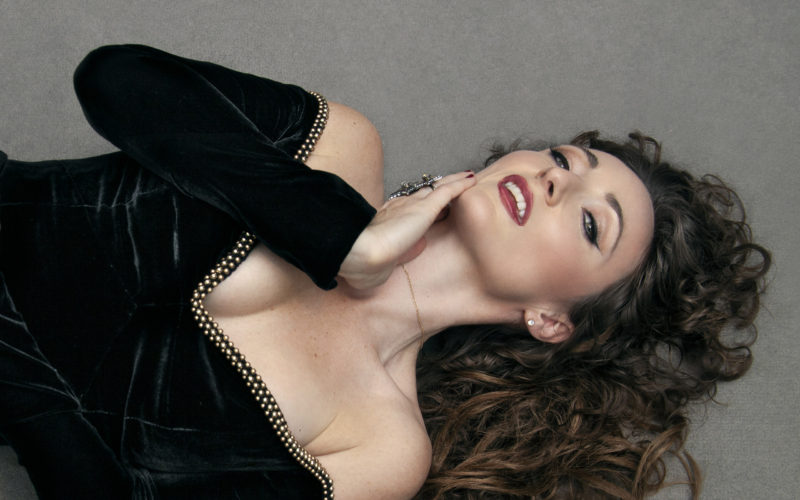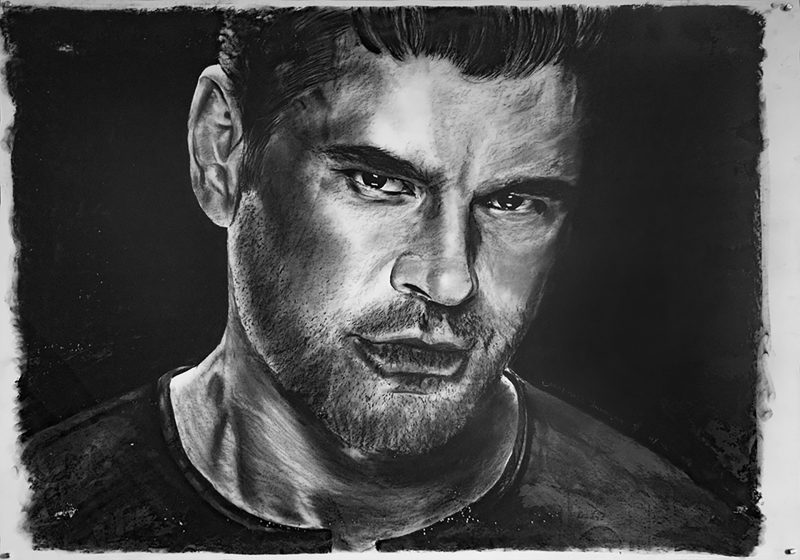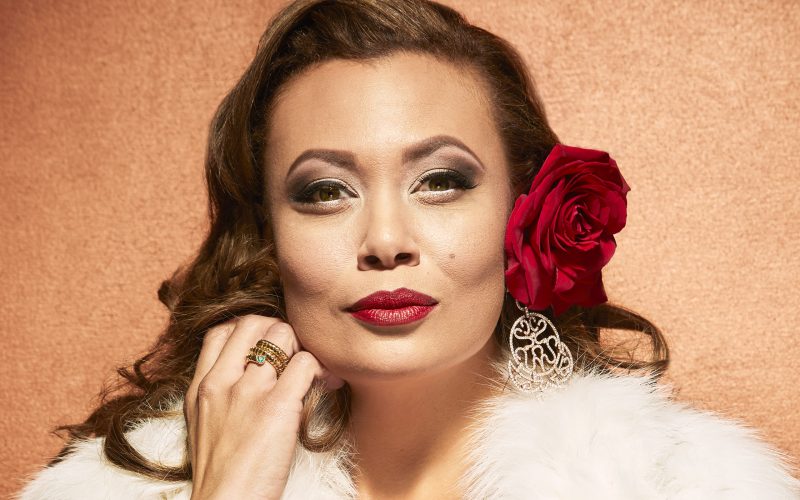writer BRIAN KEITH JACKSON
photography by DANIEL MURTAGH
styling & production by CYNTHIA ALTORISO
backdrops by CHARLES BRODERSON
The celebrated author BRIAN KEITH JACKSON is a man who has worn many hats: actor, playwright, model, journalist, muse, and at times, restless traveler takes us on a rare journey. One which only he has traveled.
Brian Keith Jackson on his writing process: My writing process depends on what I’m working on. Novels are quite different from essays or features, but they all take an emotional and/or physical toll. I’ve always had an ear for a dialogue, so I feel most at ease in that.
Most of my life people wanted me to either be one thing or another, which never suited me. “If you’d just focus on one thing you’d…” they’d say. To which I’d reply, “You should be glad I do all these things. It keeps me from killing.” They’d laugh, but I always kept a straight face.
On surrounding energy and impending danger: I’m always intrigued by those writing in cafes or coffee shops. I suppose it’s a space issue or the need to get out of the house, be around others, but I’m so susceptible to surrounding energy and find it distracting. I can revise in public, but, for me, the writing process is not very attractive. I need to be able to get up, walk around, talk to myself, rock back and forth in my chair, make guttural noises, anything to get it out. I’m rather sure if I did all of that in public the police would be called.
Shirt & pants Krammer & Stoudt
On possibilities: I tend to write early in the morning or late at night. I can revise anytime, but I need some stillness for the actual writing. I write everyday, but not necessarily on any particular thing. I’m more organic in nature. Some people find it useful to have an outline, a concrete idea of where the story is going. I let the work tell me. Like water, it’s fluid. For me, words are visual and musical, so it’s like creating a painting or a score. I welcome possibilities.
On timing: The first few lines of my first novel, “The View From Here” were written five years prior to my actually writing the book. One day I was looking in a box, going through old papers and found a print-out, you know the kind with perforated pages, and the lines were there waiting for me. A few months later I had a first draft. Sometime you’re just not ready. Like the Kellee Paterson, R&B classic, “If it don’t fit, don’t force it.”
Shirt, pants & jacket Krammer & Stoudt
Scarf Pascha Brunello
On progress: The novel I’m working on now is called “{sic}.” It’s quite different from my previous three. It takes place the early 90’s in the East Village. It’s a coming of age story and deals with being Black, young, gay, and in love during the height of the HIV crisis. I think it’s taken me so long because none of those things have really been important to people, so when you bunch them all together it’s truly beyond most. But is it? A great deal has changed in the worlds of publishing, art and film, for underrepresented “markets,” but there is still work to do, particularly as it pertains to the decisions makers, but I’m optimistic about the progress I’m seeing.
For me, words are visual and musical, so it’s like creating a painting or a score. I welcome possibilities.
Another reason it takes me a long time is that I retype every draft. Sure, I print it out, mark it up, but after I do so, I don’t just input the changes, I retype the entire manuscript. It takes a long time because I’m a slow typer and typo king. But I find it keeps me in tune with the text. Staying in the moment allows it to speak to me in a fresh new way. Keeps it fluid.
Coat, shirt & pants Krammer & Stoudt
Hat Psycho Bunny
On never saying never: I think it helped that I’ve worn many hats. I started out doing stand-up comedy, studied journalism, worked as a journalist in the early and mid 80s, then I moved to NYC in 1989 for drama school. I won’t say the name of the school because it wasn’t a great experience so they don’t deserve a mention. I was always told I was too aloof, which basically meant that they always wanted me to be on, perform at all times. As a Black guy, growing up in the South, smiling and performing at all times just isn’t something I was raised to do. The history of the South and race relations made me very aware of my carriage and how the world viewed the black male body. So I dropped out of drama school, moved from the Upper West Side to the East Village and started writing, creating stories I wanted to tell. I had some plays produced, which I acted in, got a few acting gigs, won some grants, and eventually moved into fiction, essays and features. I’m currently trying to find myself into a TV writing room, which I was told early in my career would never happen.
On self expression and plan B: Most of my life people wanted me to either be one thing or another, which never suited me. “If you’d just focus on one thing you’d…” they’d say. To which I’d reply, “You should be glad I do all these things. It keeps me from killing.” They’d laugh, but I always kept a straight face. I never saw it as lack of focus. It was more about the need to express myself, find release. I just tend to focus on what works for me.
On navigating the world: I’ve never had a plan. I suppose I admire those with five and ten year plans. Hell, I’m just trying my best to stay today. Unless I’m at my desk, I don’t even know what day it is. Don’t get me wrong. I’m very schedule oriented. I understand the value of time. I hate tardiness. I hate when plans change suddenly. Yes, I can be social. I enjoy it, but I’m not good at small talk. I need that mental transition, a moment to wrap my head around the situation, so I can present my best self. It’s not always easy, but you have to have a keen sense of self and find what best suits your personality, then navigate the world accordingly. Just because I’m fluid, it doesn’t always mean I’m willing to go with the flow.
Leaving is the hardest and easiest thing about living abroad, because you become fully aware that it is a privilege many of those you leave don’t have.
On “the journey”: I enjoy engaging with other people in all fields, the marking of time, knowing that we were all here, doing what we do, in some way contributing. Because of the exposure I got from my novels, I was able to start writing for magazines, mainly focusing on art and culture. I’ve written about many artists at the beginning of their careers like Mark Bradford, Wangechi Mutu, and Sanford Bigger, to name few. I enjoy watching their rise. I’ve always been about moving the conversation forward, making content as diverse as possible, not just for myself, but for the culture at large. That is how you develop voice, agency and, yes, even influence. I know people use the term “journey” a lot, but I really do see life in that way.
Which is probably why I lived abroad for eight years.
Suit on left David Hart
Suit & shirt on right Krammer & Stoudt
On when to make a change: In 2009, I was in a bad place. The economy had tanked, but NYC as NYC does, just kept rolling on like everything was ok. I also think that when you are someone who spends a great deal of time alone, you absorb your surroundings differently. So I moved out of my great Harlem apartment, gave all my things way, except for my art collection, I’m no fool, and moved to Beijing with two duffel bags. Many people found the move peculiar. Had I said, “Oh, I’m moving to L.A or London or Paris, or one of those known quantities, it would have been something they could grasp, but China was Chinese to them. Ok. Bad joke. As tough as NYC can be, there is a safety and familiarity in the chaos. It can become addictive. People would ask, why I was leaving, and I’d just say, “I don’t feel good.” I believe if something doesn’t feel good, you need to make a change.
I guess my style would be considered traditional with a splash of flare. You have to wear what makes you feel good… One of my friends always asks, “Are you feeling yummy?” So, I often ask myself that and it makes me chuckle. Chuckling is very underrated.
I’d visited Beijing, with the artist Mickalene Thomas, right before the Summer Olympics. I’ve always liked to visit host cities, before and after, to see how they utilize that infrastructure, while holding on to its sense of self and culture. I think both Barcelona and Beijing have been successful in that. Though Beijing was steeped in centuries of culture and history, the economic change was new and it was still trying to navigate its identity in a modern way. I found that alluring.
Of course, I never thought I’d stay for five years. I still love Beijing. I made a great many friends, many with whom I’m still in contact. When I arrived people were so optimistic, but that seemed to change once Xi came into power. More restrictions, less access, and constant uncertainty. You could feel the change, even in the smog. Since then Xi has made it so he is the leader for life, so what I was feeling was correct.
Hat Albertus Swanepoel
Suits David Hart
On curiosity: Culture and history is fascinating. I think every high school senior should be gifted the application fee of a passport. Just having it lends itself to possibilities. Travel makes you see things beyond the American or Western gaze. Logic is different, mores are different, even family dynamics are different. Yes, it can be frustrating, but you adapt. It’s extends your view and understanding of the world. But one day I woke up and was like, “I gots to go.” Two weeks later, I gave all my things to my friends. I guess I find joy in my friends having a piece of me with them. I knew I wasn’t ready to return to NYC, so I packed my two duffel bags and moved to Tunisia. I ended up staying there for three years. I’d been the year prior to work on an art project with Kehinde Wiley. The Jasmine Revolution, which started the Arab Spring, had just happened and their autocratic president fled, opening the door for democracy. So when I was thinking about places after China, Tunisia was front of mind. I wanted to see what democracy looks like in its infancy.
Suit Krammer & Stoudt
Scarf Pascha Brunello
On when to leave: Tunisia is beautiful, the light is spectacular. There was so much hope in the air, but as America can attest, democracy is a slow process. As time went on, you could sense some people started to believe they were better under dictatorship. If you’ve had a foot on your neck for so long, it can become comfortable. But, after the third terrorist attack, I was like, “I gots to go.” Again, I gave all my things away and returned to NYC with the same two duffel bags. Leaving is the hardest and easiest thing about living abroad, because you become fully aware that it is a privilege many of those you leave don’t have.
On the passing of time: New York was extremely different when I got back. Eight years away is a long time, particularly in New York. There weren’t even apps on my iPhone when I moved to Beijing, people still had landlines and actually left voice messages. So returning was like being in a familiar, yet foreign place. I’d lost some of the muscles that I used to have, but I’d also gained new ones that came from my travels. It was, and still is, about finding that balance. The city has changed, but so have I.
A great deal has changed in the worlds of publishing, art and film, for underrepresented “markets,” but there is still work to do, particularly as it pertains to the decisions makers, but I’m optimistic about the progress I’m seeing.
On personal style: I just realized how much “fluidity” influences every aspect of my life. I suppose that also includes my personal style. I’ve always been tall and thin, which is some quarters is seen as a good thing, particularly when it comes to fashion, but in other places its not the most masculine attribute, so I’m aware of my presence and my body. The great thing about clothing is that no matter who is wearing it, it’s still drag. I guess my style would be considered traditional with a splash of flare. You will rarely see me in all Black. I love “The Smiths,” but I need some color when it comes to what I wear. You have to wear what makes you feel good. I have a slow, Southern gait, a saunter, if you will, so fit, form and comfort means everything. One of my friends always asks, “Are you feeling yummy?” So, I often ask myself that and it makes me chuckle. Chuckling is very underrated.
Shirt & pants Krammer & Stoudt
On life and legacy: I don’t really know how people see me because, except on rare occasions, you’ll never really know. It’s not that I don’t care. I’m human. But I don’t really sit around thinking that people are sitting around thinking of me. That’s just not how my brain works. I’ve had great moments, seconds, minutes, never to be repeated, because those moments, seconds, minutes were just what were needed, then. I would like to be seen as someone living life as best I can, trying to push things forward in a positive way. We all have different needs. The process is allowing oneself the necessary time to figure out what those needs are. Leaving your mark isn’t a quid pro quo situation. It’s not even about “relevancy.” Life is more fluid and unpredictable than that. Sure, I can give my things away, move on, and live my life out of two duffel bags, but the most important thing are experiences gained. They travel with me, and the good thing about them is there is never an overage charge.

